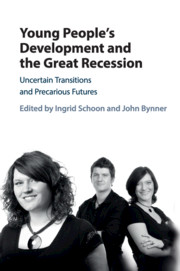Book contents
- Frontmatter
- Contents
- List of Figures
- List of Tables
- Contributors
- Acknowledgments
- Preface
- List of Abbreviations
- Part I Introduction
- Part II The Changing Context of Youth Transitions
- Part III Variations in Education and Employment Transitions during Times of Economic Hardship
- Part IV The Impact of the Great Recession on Families
- Part V Future Orientations and Well-being
- 13 Economic Recession and Youth Achievement Orientations
- 14 The Recession, Young People, and Their Relationship with the Future
- 15 The Impact of the Recession on Young People's Satisfaction with Democratic Politics
- 16 The Great Recession, Health, and Health Inequalities in Adolescents in North America, Europe, and Israel
- 17 Impact of the Great Recession on Young Adult Health: The Significance of Social Class
- Part VI Conclusion
- Index
- References
13 - Economic Recession and Youth Achievement Orientations
from Part V - Future Orientations and Well-being
Published online by Cambridge University Press: 20 October 2017
- Frontmatter
- Contents
- List of Figures
- List of Tables
- Contributors
- Acknowledgments
- Preface
- List of Abbreviations
- Part I Introduction
- Part II The Changing Context of Youth Transitions
- Part III Variations in Education and Employment Transitions during Times of Economic Hardship
- Part IV The Impact of the Great Recession on Families
- Part V Future Orientations and Well-being
- 13 Economic Recession and Youth Achievement Orientations
- 14 The Recession, Young People, and Their Relationship with the Future
- 15 The Impact of the Recession on Young People's Satisfaction with Democratic Politics
- 16 The Great Recession, Health, and Health Inequalities in Adolescents in North America, Europe, and Israel
- 17 Impact of the Great Recession on Young Adult Health: The Significance of Social Class
- Part VI Conclusion
- Index
- References
Summary
Abstract
This chapter examines the development of achievement orientations, and considers how key socialization processes may be affected in times of economic turbulence. We posit that economic recessions are detrimental for youth because of their potential to disrupt socialization to work in the family and in the workplace. We support this argument by drawing on findings from the three-generation Youth Development Study (YDS), which has followed a cohort of young people from adolescence to their mid-thirties, and has also surveyed their parents and their children. Agentic orientations are shown to yield pervasive occupational dividends; we trace their development across three generations. We also provide evidence that parental setbacks during the Great Recession impacted children's economic expectations and educational aspirations.
Introduction
Adolescence and young adulthood are critical formative periods for the development of psychological orientations, including aspirations, educational and occupational expectations and plans, and work values, all of which affect future educational and career trajectories. Economic recessions have the potential to influence, and to disrupt, the social contexts in which these agentic personal resources are formed – especially in the family and the workplace. Effects on families are particularly germane, as children observe their parents’ reactions to economic shocks (unemployment, wage loss) and uncertainty and form their own ideas about work life accordingly. Recessionary times influence adolescents and young adults directly as well, as they limit their opportunities for gainful work and the learning it provides.
In this chapter, we consider several interrelated questions to help us understand the relationships between economic recessions and the development of achievement oriented attitudes and behaviors. First, how have achievement orientations been conceptualized and how have recent societal changes and economic uncertainty affected their acquisition? Through what processes of socialization are achievement orientations developed? And finally, what is the role of parental hardship in the socialization of achievement orientations in their children?
To address these questions, we initially review key concepts surrounding achievement orientations and behavior, and describe the changing societal contexts that have arguably made their development more extended, as well as more uncertain and challenging. We present two models of socialization relevant to the development of achievement orientations: a social learning model, key to socialization in the family, and a learning-generalization model, featuring adaptation in the work setting.
- Type
- Chapter
- Information
- Young People's Development and the Great RecessionUncertain Transitions and Precarious Futures, pp. 321 - 347Publisher: Cambridge University PressPrint publication year: 2017
References
- 1
- Cited by



